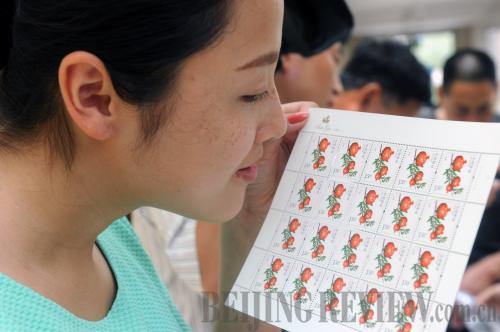|
 |
|
POSTAL PERFUME: A stamp collector smells the fragrance of a newly released set of stamps on July 15. The stamps, featuring various fruits such as apples and peaches, were printed with scented ink that corresponds with the fruit (SUN QILU) |
Fake IDs
China's police forces found 271,000 fake or duplicate ID records in the first half, all of which have been nullified, the Ministry of Public Security announced on July 12.
A total of 149 cases of counterfeiting and selling fake ID cards or household registration documents have been solved and 46 members of police officers have been punished for their involvement, the ministry said in a statement.
Last year, China found and nullified 790,000 fake IDs. By the end of this year, a system to check ID information through image-matching technology will be set up across the country, according to the ministry.
Changing Wheels
On July 16, China's central authorities released a guideline to reform the supply and use of government vehicles in an effort to cut spending.
China will stop giving vehicles for use in regular government affairs, while keeping those for special services such as law enforcement and emergencies, according to the guideline.
The Central Government will instead allocate a "proper amount" in subsidies to public servants to allow them to choose their own means of transportation.
The aim is to finish reform in central government organs by 2014 and in local governments by the end of 2015, said the guideline.
In China, officials above a certain level have usually been provided a driver and car for their work, but many have used the vehicles for private purposes, effectively wasting public funds and drawing complaint.
Government on WeChat
China's government agencies are opening more and more accounts on WeChat, an instant messaging application, to increase their online presence in a fast-changing age of social networking.
According to a report released on July 13 by the Communication University of China, there were 3,600 governmental WeChat accounts at the end of 2013, and the number was nearly 6,000 at the end of March 2014.
The report said that governmental WeChat accounts have mushroomed in the past year, as both central and lower-level government agencies have been using WeChat to interact with netizens on public issues.
Police departments hold 30.3 percent of total governmental accounts, the largest portion, the report revealed.
It listed several cases in which governments are using innovative measures to interact with netizens. For example, police in Shouguang County, east China's Shandong Province, even issued an order for arrest on WeChat.
However, problems still remain in operation, such as timely information disclosing, the report said. | 